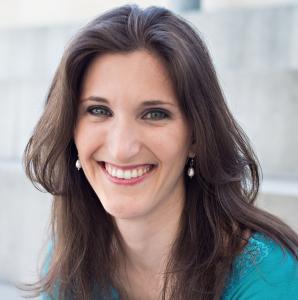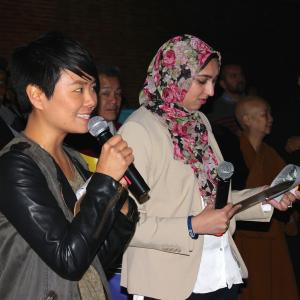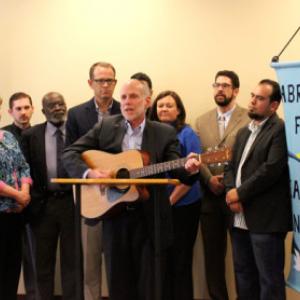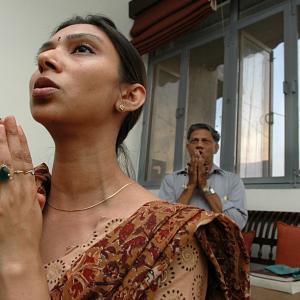
Megan Sweas (@msweas) is a freelance journalist based in Los Angeles and editor at USC's Center for Religion and Civil Culture. She is the author of Putting Education to Work: How Cristo Rey High Schools are Transforming Urban Education.
Posts By This Author
Fighting For the Right to Breathe
THE FAMILIES SHOWED up early for the South Los Angeles planning commission meeting in late January. Parents stood in the back, soothing crying babies. A young girl leaned over a chair, coloring in a house with bright pink solar panels on a purple roof. “Clean energy can come from the sun,” her page read.
They showed up in force to oppose an oil company’s appeal to new and revised zoning restrictions on the Jefferson drill site, an oil field in their neighborhood. They lined up to share stories of the nauseating smells, disruptive noises, concerns about the risk of catastrophic explosion, and fears of the drill site’s long-term health impacts on their children.
When Niki Wong approached the microphone, she asked everyone against the oil field to stand. “Tonight families, children, and residents are here to stand for a healthy future,” she said, as nearly all the 70 attendees—except for the five representatives of the oil company—rose behind her.
Wong lives within a half mile of the drill site and walks by it every day. As the lead community organizer with Redeemer Community Partnership, a Christian community development corporation that has been working in South Los Angeles since 1992, she speaks not only for herself but also for her whole community.
Her faith community’s fight against the drill site represents a distinctive approach to ministry, one that introduces Christians to new social issues, including environmental justice. Embedding themselves into the community has allowed Wong and Church of the Redeemer, an Evangelical Covenant Church, to become powerful advocates for change.
At the appeals hearing, when the representatives of Sentinel Peak Resources, which bought the Jefferson drill site in 2017, described themselves as a “good neighbor,” Wong was incredulous. A native of Sugar Land, Texas, Wong is intimately familiar with the energy industry. Both of her parents and many friends work in jobs related to the industry.
When she tells friends about her work, she lays out the facts: The drill site operates in an area with a density of more than 30,000 people per square mile, with nothing but an 11-foot-high wall between the site and the multifamily residences next door. Church of the Redeemer meets in a school a couple of blocks away. Most residents are people of color and living in poverty. They are renters, nearly half holding less than a high school education, and about a quarter do not speak English.
“The desire and need for fossil fuels is creating sacrifice zones, and my neighborhood is one of them,” Wong tells them. “Part of what it means to be a Christian is thinking about these things and making decisions that would be in line with what is just and what takes care of people on the margins.”
Japanese Americans Remember Pearl Harbor Backlash and Support Muslims

Image via Megan Sweas / RNS
After 9/11, Kathy Masaoka heard a Muslim woman on the radio describe her hesitancy to go to the market for fear of being attacked.
“It crystalized for me at that moment, that this must be how my parents felt and how my family felt after Pearl Harbor,” she said.
Masaoka’s family is Japanese American. As a young man during World War II, her father was drafted into the Military Intelligence Service while his parents and siblings were sent to California’s Manzanar internment camp in the desert east of the Sierra Nevada. They lost their family business in Los Angeles.
Interfaith Group Speaks Out in Wake of Santa Barbara Shooting Spree
An interfaith group representing 15 organizations spoke out against gun violence Thursday in the wake of last week’s deadly shooting spree in Santa Barbara.
Religious organizations have lobbied for stricter gun control in the wake of mass shootings, and this latest effort was no exception.
“We are here this morning to stand with the multitude of groups across the United States who are advocating for sensible, common sense laws to limit the effects of gun violence,” said Steve Wiebe, co-chair of the Abrahamic Faiths Peacemaking Initiative. “Our faith traditions — Judaism, Christianity, and Islam — spur us to peaceful solutions as we recognize the inherent worth of each individual life.”
Elliot Rodger killed six and injured 13 others in Santa Barbara on Friday before dying by an apparently self-inflicted gun wound. The Santa Barbara County Sheriff’s Office reported that deputies found three semi-automatic handguns in his car. All three were bought legally.
Sultans of Satire Aims to Bridge Gaps with Muslims, Arabs Through Comedy
LOS ANGELES — Unshaven and wearing a black hoodie and cap, Omar Elba looked out from the lectern, surrounded by a gold cross and organ pipes. "Moses, you are my nizzle fo' shizzle," said the Egyptian-born Muslim comedian, doing his best to channel Snoop Dogg.
It's a joke he's done before, but never in a church.
The unique setting of their performance inside Westwood Hills Congregational Church wasn't lost on any of the performers at the Sultans of Satire comedy show. Yet the sacred stage didn't keep them from swearing or talking about sex, although it inspired more jokes about growing up Jewish, Muslim, and Christian than one might typically hear during stand-up.
"I don't know whether to tell jokes or tell you my confessions," Elba said, opening up the show.
Parents Take Teaching Hinduism Into Their Own Hands
SANTA MONICA, Calif. --- Children are usually the primary complainers about Sunday school, but when Mudita Bahadur started looking for excuses not to take her children to the Hindu temple on Sunday, she knew she had to make a change.
"One, it's dogmatic and two, it's inconvenient," she said of the Hindu classes held a 45-minute drive away from her home in Santa Monica, Calif.
Bahadur decided to take her children's religious education into her own hands. For the past three years, she and other Indian parents have been teaching their children about religion in each other's living rooms.
The do-it-yourself approach permits them to instill pride and progressive values in a traditional manner, the parents say.
Unable to Work, Indian Immigrant Women Turn to Spiritual Practices for Comfort
LOS ANGELES -- Even though she met her husband through an arranged marriage, Pooja Sindhwani considers herself a modern woman. She worked in interior design in her native India for four years, and she and her husband spent a year getting to know each other before their wedding. When she followed her husband to Houston, she wasn't worried about adjusting to life in the United States.
"You feel you're going to a country that offers opportunities," Sindhwani said, "you expect that things will work out."
Except when they don't.
Unable to land a job in Houston, Sindhwani slipped into depression. Like thousands of Indian women, she was issued an H-4 "dependent spouse" visa that did not allow her to work.
Sindhwani's husband was a highly skilled foreign worker, sponsored by a U.S. company on an H-1B visa. The Indian women who marry highly skilled workers also tend to be well-educated professionals. Many think it will be easy to transfer from a dependent spouse visa to a work visa.
The constant rejections from companies that couldn't sponsor her work visa took a toll on Sindhwani.
Matchmaker, Matchmaker, Make Me a (Hindu) Match
Kamna Mittal and her husband moved to the Bay Area soon after they were married in India in 2000. In addition to being in a new country, the couple were new to each other. Their marriage had been arranged.
"When you go for an arranged marriage," she said, "it's a total gamble."
Now a mother of two, Mittal counts herself lucky that it worked out, but 12 years later, she wants to help Indian-American singles in the Bay Area meet directly.
Turns out even love can use a little help every now and then, and the age-old practice of arranged Hindu marriages is getting a 21st-century makeover.




